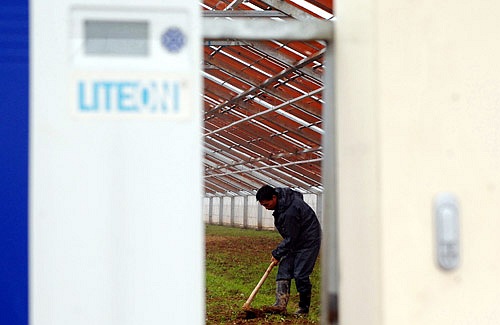|
 |
|
GREENHOUSE OF THE FUTURE: A farmer in Shaxi, Jiangxi Province, takes care of vegetables in a thin-film solar-powered greenhouse. Differing from standard greenhouses, this one maintains its own warmth, generates electricity and provides lighting (ZHOU MI) |
Volvo Acquisition Deal
Ford Motor Co. recently announced it was close to finalizing a deal to sell its Volvo brand to Zhejiang Geely Holding Group Co. Ltd., one of China's largest private automakers.
On the company website, Ford confirmed that "all substantive commercial terms relating to the potential sale of Volvo have been settled," but added that "some work still remains to be completed before signing—including final documentation, financing and government approvals."
The value of the deal, which Ford said it expects to sign in the first quarter of 2010, has been estimated at nearly $2 billion, about one third of the price Ford spent to acquire Volvo in 1999.
Rural Endeavor
China's Central Conference on Rural Work, the highest level meeting on rural work where the Chinese Government maps out policies and measures for next year's development on agriculture and rural areas, was held December 27-28 in Beijing.
Policymakers agreed to strengthen efforts to increase farmers' incomes and expand demands in rural areas.
The government also pledged to increase subsidies to the agricultural industry and take measures to support rural employment and infrastructure improvement in the countryside, including reservoirs, irrigation facilities and power grids.
Financial Integration
Top finance officials from East Asian countries and regions have officially signed the Chiang Mai Initiative Multilateralization to address short-term regional needs for currency liquidity, the People's Bank of China, the central bank, said on December 28.
The agreement was signed by the finance ministers and central bank governors of China, Japan, South Korea, the 10 ASEAN (Association of Southeast Asian Nations) countries, as well as the Hong Kong Monetary Authority chief.
Under the initiative, a $120-billion regional reserve pool will be built to provide emergency liquidity for signatory countries and regions in the event of a financial crisis.
China and Japan will contribute $38.4 billion each to the liquidity pool and South Korea will offer $19.2 billion. The 10 ASEAN nations will provide a combined $24 billion.
Environmental Economy
China's first fund for the environmental industry was launched December 28 in Beijing, aiming to promote investment in the country's environment related sectors.
The Environment Industry Fund, managed by China General Technology Investment Fund Management Corp., is expected to raise 2 billion yuan ($292.8 million) by the second quarter of 2010. The money will be invested in the water industry, solid waste disposal, renewable energy, energy conservation and emissions reduction sectors, said Liu Debing, Chairman of the fund management company, to Xinhua News Agency.
Li Dang, General Manager of China General Technology Group, the parent group of the fund management company, said the investment is in line with the country's economic shift to greener growth and is expected to reap profitable returns.
Power Prospects
China's electricity generating capacity will increase to 860 million kilowatts at the end of 2009, the second largest after the United States, said Zhang Guobao, Director General of the National Energy Administration.
The nation's power grid coverage has become the world's largest with the expansion of an ultra-high voltage network, said Zhang.
Meanwhile, development of new energies, like wind power and nuclear power, are also making progress, added Zhang.
Currently, more than 70 percent of the nation's electricity is coal-fired and the government has pledged to increase the capacity of new energy to 15 percent of its total by 2020. | 